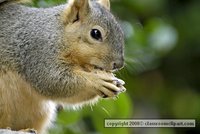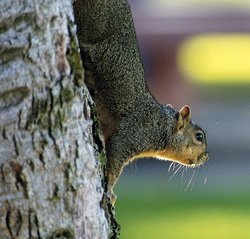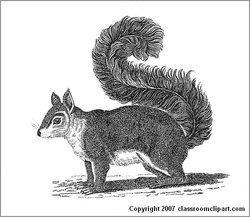Squirrel
|
|
| Squirrel | ||||||||||||||
|---|---|---|---|---|---|---|---|---|---|---|---|---|---|---|
 Eastern Gray Squirrel, Sciurus carolinensis | ||||||||||||||
| Scientific classification | ||||||||||||||
| ||||||||||||||
| Genera | ||||||||||||||
|
Many, see the article Sciuridae. |
Squirrel is the common name for rodents of the family Sciuridae, and can sometimes be used to describe someone who is a 'goof' or 'clown' (ie: he is a squirrel or is 'squirrely'). In everyday speech in the English-speaking world it usually refers to members of the genera Sciurus and Tamiasciurus. These typical members of the family are tree squirrels with large bushy tails, and are native to Europe, Asia and the Americas. Similar genera are found in Africa. However, the Sciuridae also include flying squirrels, and ground squirrels such as the chipmunks, prairie dogs, and woodchucks. The unrelated family Anomaluridae also have "squirrel" in their common name, though they are usually referred to as "scaly-tailed flying squirrels". The original translation of the word "squirrel" literally means "animal with the tail that casts a shadow." It comes from Greek, the syllables skia meaning shadow and oura meaning tail.
Typical squirrels include the European Red Squirrel Sciurus vulgaris, the Fox Squirrel S. niger, the Eastern Gray Squirrel S. carolinensis, the Western Gray Squirrel S. griseus, and the American Red Squirrel Tamiasciurus hudsonicus.
One well-known trait of some species of squirrel is the gathering and storing of nuts for the winter. These squirrels are scatter-hoarders, i.e. they will gather nuts and store them in any accessible hiding place, usually by burying them. Recent research shows that they have excellent memories for the locations of these caches. Squirrels also nest; these nests are called dreys.Squirrels are generally clever and persistent animals; in residential neighborhoods they are notorious for eating out of bird feeders, digging in potted plants either to bury or recover food, and for setting up house in sheltered areas including attics. Many companies sell bird feeders which are supposedly "squirrel-proof"; most of them in fact are not.
Squirrels are sometimes also pests because they chew on various edible and inedible objects; the habit helps keep the squirrel's teeth sharp and also wears the teeth down (rodents' teeth grow continuously). Homeowners in areas with a heavy squirrel population must keep attics and basements carefully sealed to prevent property damage caused by nesting squirrels. Fake owls and scarecrows are generally ignored by the animals, and the best way to prevent chewing on an object is to coat it with something to make it undesirable: for instance a soft cloth or chili pepper paste or powder. Squirrel trapping is also practiced to remove them from residential areas.
Squirrels can be trained to be hand fed. Because they are able to cache surplus food, they will take as much food as you put out. If a person starts to feed one, that squirrel will come back day after day to get its food. Squirrels living in parks and campuses in cities have learned long ago that humans are typically a ready source of food. Feeding is not recommended, however, because squirrels may carry plague or other animal-borne diseases. Even if they do not carry disease, they often have a hard time telling fingertips from food, and bites are painful.
The Red Squirrel populations in Britain, Ireland and more recently, northern Italy, have declined and become regionally extinct in recent decades, primarily because of competition from Gray Squirrels (introduced from North America), but also habitat loss. Conservation efforts include preserving and planting the conifer forests that Red Squirrels prefer. The recent colonisation of mainland Europe from Italy by Gray Squirrels is expected to result ultimately in the extinction of the Red Squirrel over most of Europe.
| Contents |
Diet
Many people think of squirrels as herbivores but they are actually omnivores. Squirrels eat a wide variety of plant food including nuts, seeds, fruits, and green vegetation. Squirrels also eat insects, fungi (ex. mushrooms), eggs, and even small birds, smaller mammals, and frogs.
Popular culture references
Despite periodic complaints about the animal being a pest, general public opinion towards the animal is favourable, thanks to its attractive appearance and graceful movement, and its habit of gathering and storing nuts. Squirrels are popular characters in cartoons and children's books, such as the books of Beatrix Potter. A less typical fictional squirrel is Secret Squirrel.
The word squirrelled, meaning to have hidden items away, is arguably the longest one-syllable word in the English language.
Squirrels are often refered to as "tree rats" or "harveys" by people who dislike them and consider them pests.
Pictures
- Pictures of Squirrels (http://classroomclipart.com/cgi-[bin/kids/imageFolio.cgi?direct=Animals/Squirrels)
- Squirrel Clipart (http://classroomclipart.com/cgi-bin/kids/imageFolio.cgi?direct=Clipart/Animals/Squirrel_Clipart)
Clipart and Animal Pictures
- Clipart (https://classroomclipart.com/image/category/clipart.htm)
- Animal Clipart (https://classroomclipart.com/image/category/animal-clipart.htm)
- Animal Animated Clipart (https://classroomclipart.com/clipart/Animations/Animals.htm)
- Pictures of Animals (https://classroomclipart.com/image/category/animal-photos.htm)
- Amphibian Clip Art, Pictures and Photogaphs (https://classroomclipart.com/image/category/amphibian-clipart.htm)
- Farm Animal Clip Art, Pictures and Photographs (https://classroomclipart.com/image/category/farm-animal-clipart.htm)
- Mammal Clip Art, Pictures and Photographs (https://classroomclipart.com/image/category/mammal-clipart.htm)
- Marine Animal Clip Art, Pictures and Photographs (https://classroomclipart.com/image/category/marine-life-clipart.htm)
- Reptile Clip Art, Pictures and Photographs (https://classroomclipart.com/image/category/reptile-clipart.htm)
- Spider Clip Art, Pictures and Photographs (https://classroomclipart.com/image/category/spider-clipart.htm)
See also
External links
- Full list of the Sciuridae (http://www.angelfire.com/fl/scalisti/species.html)
- Save the Red Squirrel (http://www.wildlifetrust.org.uk/durham/RedAlert/)
- Jon's World o' Squirrels (http://gottshall.com/squirrels/)
- Looking to rehabilitate a baby Squirrel? Go here (http://www.squirrel-rehab.org/)
- Those Darn Squirrels -- Squirrel Photography (http://www.thosedarnsquirrels.com/)



